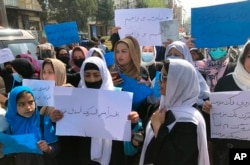Afghanistan's Islamist Taliban arranged Thursday a men-only conference of about 3,500 mostly clerics and tribal elders from across the country in an apparent bid to demonstrate their hold on power and domestic legitimacy.
The three-day, closed-door conference began in Kabul amid tight security in the wake of a recent spike in Islamic State-claimed terrorist attacks in the Afghan capital and elsewhere in the war-torn South Asian nation.
The insurgent-turned-ruling group seized power last August, when the United States and NATO partners withdrew their final troops from Afghanistan after almost two decades of military intervention, but the world has not yet recognized the interim Taliban government.
Acting Taliban Defense Minister Mullah Mohammad Yaqoob, while addressing Thursday's inaugural session, urged participants to share their advice and suggestions to help strengthen the government so it can deal with foreign policy issues.
"You can see that even after completing almost one year, no country — be it Muslim, non-Muslim, neighboring or regional — has formally recognized this regime," Yaqoob said.
"My fundamental demand from you all is to courageously formulate a fatwa (decree) for us that helps us end our shakiness in terms of resolving our external problems and bridge any differences that, God forbid, may arise in future between us and the (Afghan) nation," the defense minister said without elaborating.
The Taliban's harsh treatment of women and girls and a lack of political inclusivity in governance have kept the global community from granting diplomatic recognition to the new Afghan rulers.
The Islamist group has suspended secondary education for most teenage female students, ordered women to wear face coverings in public and barred them from traveling beyond 70 kilometers without a close male relative.
The U.S. and the world at large have been urging the hardline group to reverse some of its curbs on women and ensure inclusive governance if it wants them to consider the Taliban's demand for diplomatic recognition.
Taliban chief spokesman Zabihullah Mujahid, later in the day, briefed reporters about the opening proceedings, saying women were not invited to the meeting because it was organized on the request of independent participating scholars and the government had nothing to do with attendees nor the agenda of the event.
Mujahid said Hibatullah Akhundzada, the reclusive Taliban chief, "may" also attend the ongoing Kabul gathering, but he shared no further details.
Taliban leaders have rejected calls for removing the restrictions on women, insisting they are in accordance with Afghan culture and Islamic Shariah law.
Acting Taliban Deputy Prime Minister Abdul Salam Hanafi argued on Wednesday that women's participation in the huddle was taking place as their male family members would attend.
Critics questioned the effectiveness and legitimacy of the grand scholars' meeting in the absence of women, almost 50% of the country's estimated 40 million population.
"Durable peace and reconciliation also requires inclusive administration represented by all political, religious and ethnic groups," said Richard Bennett, the U.N. special rapporteur on the situation of human rights in Afghanistan.
"It is vital that national ethnic religious and linguistic minorities, including minority women in Afghanistan, are included in all decision-making processes," Bennett remarked at an online seminar Tuesday.
Rina Amiri, the U.S. special envoy for Afghan women, girls and human rights, while addressing the seminar, suggested rights-related issues would require engagement with the new rulers in Kabul.
"We try to identify very specific measures that the international community can consider and can try to move forward and also how we can press the Taliban to do more because they are right now the reality in the country," Amiri said.
Torek Farhadi, a former Afghan official and political commentator, is skeptical about the outcome of the meeting.
"An allegiance from 3,000 selected guests by (the) Taliban in a meeting will not help fix any of the problems (facing the country), nor confer any internal or external legitimacy to (the) Taliban," Farhadi told VOA.
"The book of God in Islam is gifted to women and men equally. Depriving women to have a voice in society is going against the precepts of Islam."
The Taliban takeover and their subsequent installation of an all-male interim government prompted Washington and other Western countries to immediately halt financial assistance to largely aid-dependent Afghanistan, seize its foreign assets worth more than $9 billion, mostly held by the U.S., and isolate the Afghan banking system.
The action and long-running terrorism-related sanctions on senior Taliban leaders have thrown cash-strapped Afghanistan into a severe economic upheaval, worsening an already bad humanitarian crisis blamed on years of war and persistent drought.







